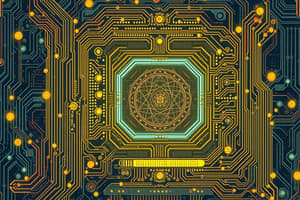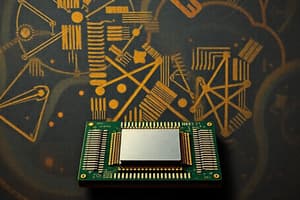Podcast
Questions and Answers
Which principle requires computing professionals to uphold laws while ensuring ethical responsibilities are met?
Which principle requires computing professionals to uphold laws while ensuring ethical responsibilities are met?
- Honor laws and regulations (correct)
- Be honest and trustworthy
- Accountability
- Fairness and non-discrimination
What ethical principle highlights the importance of honesty and trustworthiness in professional computing work?
What ethical principle highlights the importance of honesty and trustworthiness in professional computing work?
- Accountability
- Be honest and trustworthy (correct)
- Fairness and non-discrimination
- Respect privacy and maintain confidentiality
Which ACM guideline emphasizes respecting the privacy of individuals and maintaining confidentiality?
Which ACM guideline emphasizes respecting the privacy of individuals and maintaining confidentiality?
- Accountability
- Respect privacy and maintain confidentiality (correct)
- Be honest and trustworthy
- Fairness and non-discrimination
What ethical concept involves being fair and treating all people equitably, without discrimination?
What ethical concept involves being fair and treating all people equitably, without discrimination?
What is the term for taking responsibility for one's computing decisions and their consequences?
What is the term for taking responsibility for one's computing decisions and their consequences?
What branch of computing is used to model and simulate biological systems and processes?
What branch of computing is used to model and simulate biological systems and processes?
What is the name of the temporary storage that a computer uses to hold data while it’s being processed?
What is the name of the temporary storage that a computer uses to hold data while it’s being processed?
Which principle in the ACM Code of Ethics emphasizes the need to avoid harm to others?
Which principle in the ACM Code of Ethics emphasizes the need to avoid harm to others?
What term describes the use of social media data to analyze societal behaviors and trends?
What term describes the use of social media data to analyze societal behaviors and trends?
What type of software manages computer hardware and software resources?
What type of software manages computer hardware and software resources?
What is the process of analyzing large datasets from social networks to study human behavior called?
What is the process of analyzing large datasets from social networks to study human behavior called?
What term refers to the technology that allows players to experience and interact with games in a 3D environment?
What term refers to the technology that allows players to experience and interact with games in a 3D environment?
What does the acronym 'ACM' stand for in computing ethics?
What does the acronym 'ACM' stand for in computing ethics?
Flashcards are hidden until you start studying
Study Notes
Computing Hardware & Software
- RAM (Random-Access Memory): Used to temporarily store data while the computer processes it. It can be easily rewritten and modified.
- Cache Memory: Faster than RAM, it improves CPU performance by storing frequently used data.
- CPU (Central Processing Unit): The brain of the computer that executes instructions from software.
- Hardware: Physical components of a computer that can be touched and seen.
- Operating System (OS): Software that manages computer hardware and software resources.
- Graphics Processing Unit (GPU): Specialized hardware designed for handling complex graphics in modern video games.
Computing Ethics & Principles
- Avoid Harm: Principle in the ACM Code of Ethics, emphasizing the need to avoid harm to others through computing practices.
- Honor Laws and Regulations: Computing professionals must uphold laws and regulations, ensuring ethical responsibilities are met.
- Be Honest and Trustworthy: Principle emphasizing the importance of honesty and trustworthiness in computing work.
- Respect privacy and maintain confidentiality: ACM guideline promoting respect for individual privacy and maintaining confidentiality of information.
- Fairness and Non-Discrimination: Ethical principle that promotes treating all people equitably, without discrimination.
- Accountability: Taking responsibility for computing decisions and their consequences.
Computing in Specific Fields
- Computational Biology: Branch of computing used to model and simulate biological systems and processes.
- Bioinformatics: Application of computing that analyzes biological data, especially large datasets like DNA sequences.
- Biostatistics: Field that combines biology, statistics, and computing for analyzing large biological datasets.
Other Concepts
- Social Media Analytics: Use of social media data to analyze societal behaviors and trends.
- Social Network Analysis: Analyzing large datasets from social networks to study human behavior.
- Software: A set of instructions that a computer follows to perform tasks.
- Game Design: The process of creating game characters, settings, and animations using computers.
- Virtual Reality (VR): Technology that allows players to experience and interact with games in a 3D environment.
- Cloud Gaming: Streaming video games over the internet without downloading them.
- C++: Programming language often used to develop video games.
- ACM (Association for Computing Machinery): Organization that provides a code of ethics for computing professionals.
- Read-Only Memory (ROM): Non-volatile memory that stores data permanently even when the power is off.
- Internet: Global network that connects millions of private, public, academic, and government networks.
Historical Computing
- The Abacus: Ancient tool considered the first known calculating computer.
- The Jacquard Loom: Invented in the 19th century, it used punch cards for programmable patterns, influencing later computer technology.
- Charles Babbage's Mechanical Computer: The first mechanical computer, developed in the early 19th century.
Studying That Suits You
Use AI to generate personalized quizzes and flashcards to suit your learning preferences.




